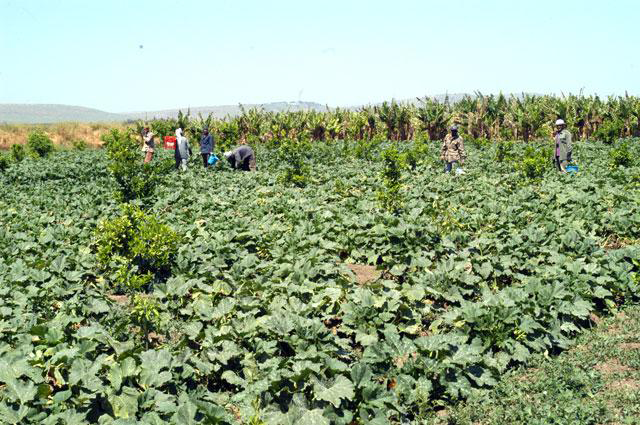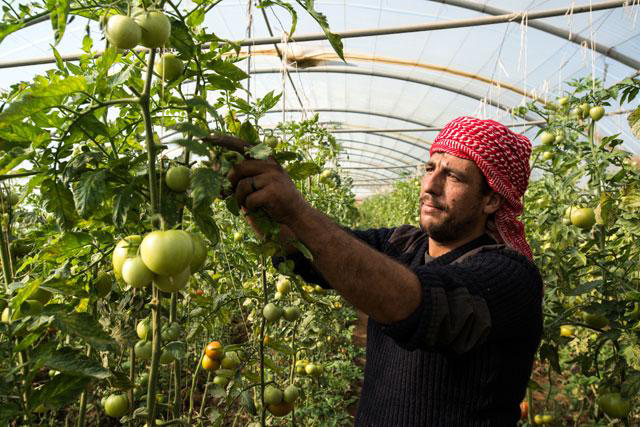You are here
Tamkeen launches coalition to strengthen rights for agricultural workers
By Maria Weldali - Nov 04,2024 - Last updated at Nov 04,2024

Tamkeen has recently launches a coalition to advocate for enhanced rights for agricultural workers, with a primary goal of increasing awareness of the 2021 Agricultural Labour Bylaw (JT file)
AMMAN — Tamkeen has recently launched a coalition to advocate for enhanced rights for agricultural workers, with a primary goal of increasing awareness of the 2021 Agricultural Labour Bylaw.
Tamkeen said that the Prime Ministry recently approved amendments to the 2024 Agricultural Labour Bylow, aiming to align with the Economic Modernisation Vision’s goal of advancing the agriculture sector and increasing employment opportunities for Jordanians.
The coalition was introduced at Tamkeen’s discussion session titled “Conditions of Agricultural Workers after the Implementation of the Agricultural Labour Bylow and its Practical Effectiveness.”
The session reviewed the regulation’s impact within the unique agricultural context and addressed the challenges faced by workers.
Tamkeen’s executive director Linda Kalash underscored the coalition as a platform for both small farm owners and agricultural workers.
Kalash noted that, despite being over a decade overdue, the 2021 bylaw is a positive step forward, emphasising the need for further amendments to enhance protections for agricultural workers.
Bushra Salman, president of the General Union of Workers in Water, Agriculture, and Food Industries, highlighted challenges within the agricultural sector, particularly its division into unregulated daily and seasonal labour and a regulated segment covered by Jordanian labour law.
Salman noted that the regulated segment, primarily export-oriented, adheres to labour standards, with union agreements helping to ensure fair practices.
Salman also outlined challenges in the unregulated segment, where daily wages are often inconsistent, adding "In South Ghor, workers earn approximately JD6 plus JD0.5 for breakfast, while in Mafraq, wages average JD7. Refugee workers, frequently willing to work for lower wages, are often preferred by employers due to the added support of family involvement."
"Female workers in unregulated roles face additional challenges, with a lack of basic protections such as maternity leave, paid nursing breaks, and social security coverage, leaving them vulnerable to injuries and without social protections. These workers also face harsh conditions, including exposure to extreme heat, sun, and risks like snake bites, she added.
Representing the Farmers Union, Khawla Tawalbeh highlighted the economic and political pressures impacting agriculture, with taxes placing additional burdens on farmers.
Tawalbeh stressed that both employers and workers share responsibility for public safety, and while small farm owners face economic strains, they are required to adhere to labour laws and ensure safe working conditions, as workers are essential to production.
Tawalbeh also highlighted specific issues for female workers, including a lack of safe transportation, inadequate sanitary facilities, poor treatment from some employers, and insufficient safety measures, expressing concern regarding the lack of regulatory oversight on farms and minimal enforcement of existing sector regulations.
Maha Ghraib from the Ministry of Labor’s Central Inspection Directorate said that the ministry received around 130 complaints from the agricultural sector in 2023 and conducted 660 inspections of agricultural facilities, noting that more inspections are needed, but the ministry’s limited inspector workforce, between 160 and 180 nationwide, poses a challenge to increasing these efforts.
Related Articles
AMMAN — Policy gaps among the parties concerned with the regulation of migrant work in the Aqaba Special Economic Zone (ASEZ) are leading to
AMMAN — Agricultural cooperatives play a crucial role in protecting farmers' rights, providing them with economic stability, bargaining powe
AMMAN — A total of 4,987 expatriate workers have been deported since the beginning of the year due to violations of the provisions of the La















